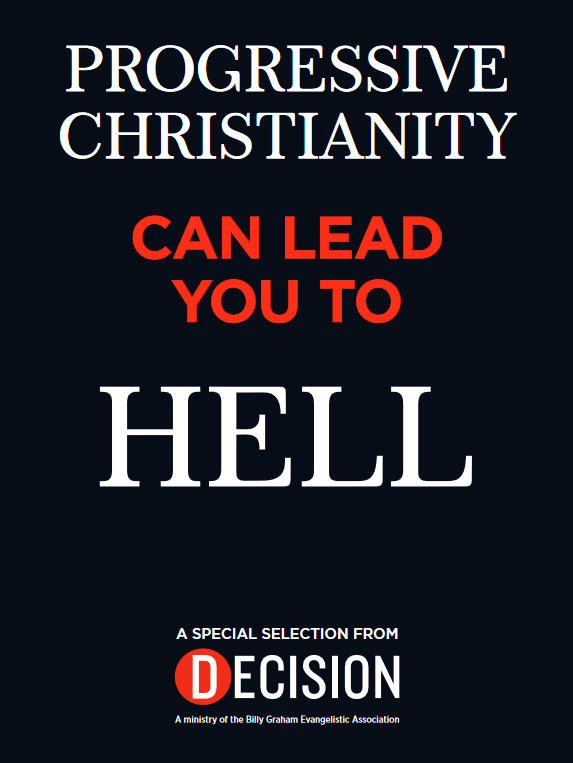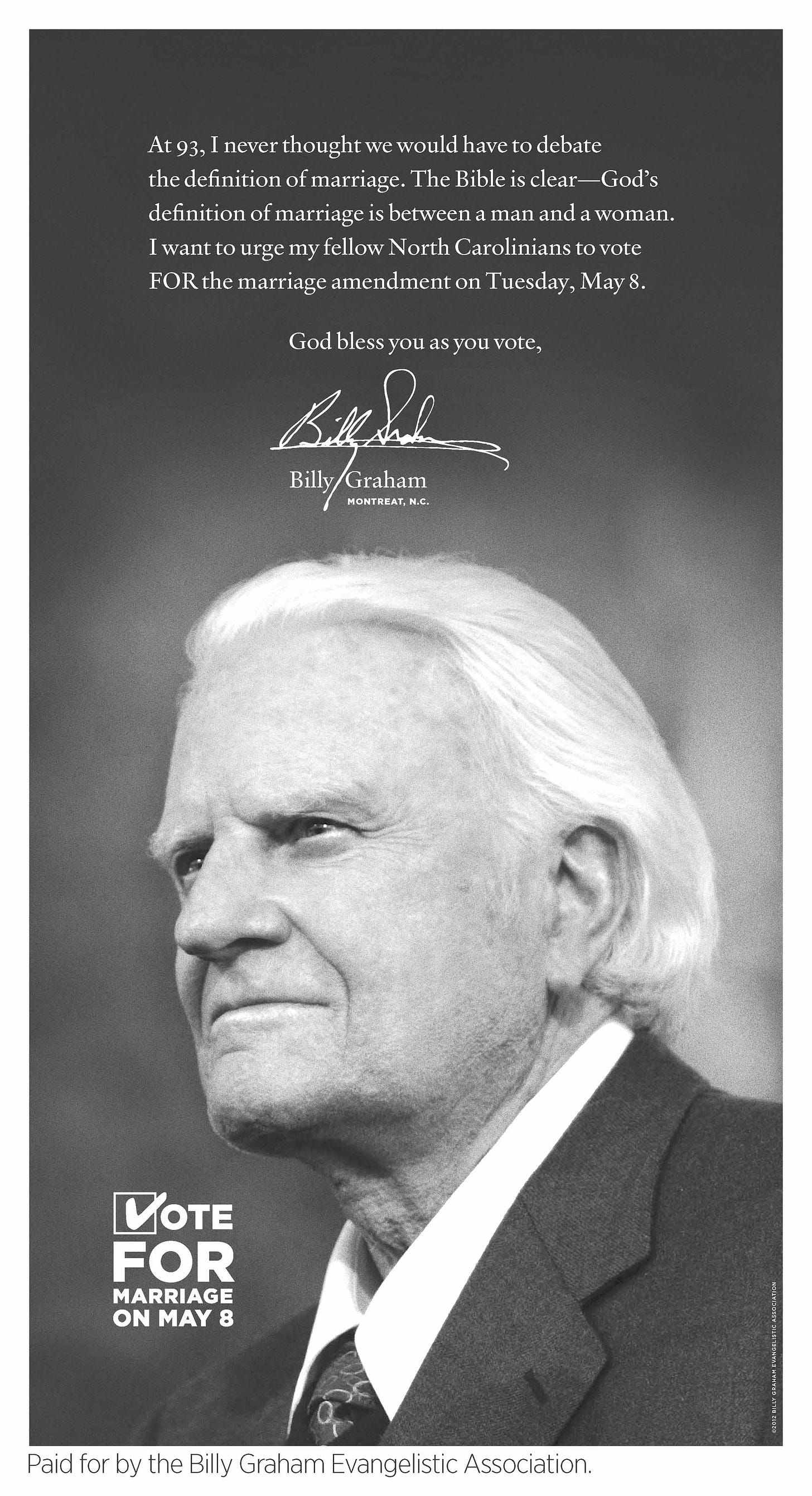
In Part 1 of this series, “Growing Up in Graham Country,” I talked about how living at the epicenter of the Graham family dynasty shaped my childhood and early professional career. I described Billy’s historical homophobia, antisemitism, and sexism, and how the ubiquity of his fame protected him from much local criticism over those views. I explained how the national culture war over same-sex marriage rights first reached Montreat through a doctrinal split in the local Presbyterian Church and hinted at the Billy Graham Evangelistic Association’s influence over a certain state election. What I didn’t mention was that, starting long before Rev. Graham’s death, the organization that wore his name was becoming less about preserving and continuing Billy’s ministerial legacy and more of a vehicle for his eldest son’s political power trip. Nowadays, the marketing materials and signage may still say “Billy Graham” but “BGEA” spells Franklin. And Franklin does not practice what his father preached.
Some readers may have heard of the “Billy Graham Rule” in the context of avoiding allegations of sexual immorality. There are actually four Graham Rules, written in a series of resolutions known as the Modesto Manifesto, which Rev. Graham and his ministry team used as guidelines for the overall integrity of their work. Franklin Graham is rare among evangelists in that he’s so far avoided even the appearance of a sex scandal. Since inheriting leadership of the BGEA in 2000, he’s managed to ignore or outright abandon the other three parts of his father’s ethical framework and poison too many hearts and minds in our shared hometown.
Respect for Other Religions and Faith Leaders: In 2001, soon after the terrorist attacks on the World Trade Center and Pentagon, Franklin called the entire Islamic faith a “very evil and wicked religion” and “a greater threat than anyone's willing to speak.” When Muslim clerics offered to meet with Franklin to discuss his statements, he refused, claiming they were trying to “indoctrinate” him. Several Christian leaders called his claims unbiblical and irresponsible, and cautioned that his rhetoric could undermine international political diplomacy and encourage anti-Muslim hate crimes. Franklin’s response was to double down. On a book tour in 2006, he claimed that mainstream Islam could not be separated from extremists because the Quran was inherently violent. He described Christianity and Islam as “eternal enemies locked in a classic struggle that will end with the second coming of Christ."
Franklin doesn’t just play “My God is Bigger Than Your God” with other faiths. He directs plenty of it toward his fellow Christians whose beliefs or practices don’t happen to match his own. In his view, Evangelicals must “guard the truth of genuine Scriptural preaching and living” against the war he claims is being waged on Biblical Christianity. Any version of religious Progressivism that incorporates elements of racial and social justice is illegitimate, “morally dangerous,” and sure to lead its hapless followers directly into eternal damnation. Other, less militant Baptist ministers took the time to highlight the drawbacks of Franklin’s approach:
“Franklin Graham’s scare tactic that ‘progressive Christianity can lead you to hell’ further illustrates the aversion many have to his approach to Christianity. Many people are leaving conservative Christianity not because they are dissatisfied with Jesus but rather because of the repulsive approach of people like Graham who are so unkind and degrading to others and who seek to align with the political establishment to gain power to propagate their version of faith.”
- Dr. Patrick Wilson
Without one apparent hint of irony, Franklin’s response to those who dared critique him was “And who has the right to tell me what I should pray?”
Resisting Greed and Maintaining Financial Transparency: In 2015, BGEA reclassified its federal tax status from a nonprofit organization to an association of churches. This means that, despite receiving over $100 million in tax-exempt revenues, BGEA is no longer required to publicly disclose the annual salary and compensation amounts paid to its top executives. Franklin Graham has long been critical of financial scrutiny from the IRS. When both BGEA and Franklin’s humanitarian relief organization, Samaritan’s Purse, were selected for audits in 2013, he called the decision “morally wrong and unethical” and claimed it was an attempt by the Obama administration to “target and intimidate us.” Coincidentally, organizations classified as “associations of churches” do not have to comply with Section 703 of The Civil Rights Act, which prohibits religious discrimination in any aspect of employment, including hiring, firing, compensation and benefits (such as health insurance coverage), assignment, and classification of employees. A BGEA spokesperson claimed the new tax status would allow the organization to “better safeguard its religious liberties” while avoiding what he described as an “onerous” paperwork burden.
Honesty and Integrity in Public Communication: A year after “Don’t Ask, Don’t Tell” was finally repealed, North Carolina decided to become one of the last states to upgrade its existing statutory ban on same-sex marriage with a proposed state constitutional amendment that would also extend to civil unions and domestic partnerships. The matter was put before voters on the spring primary ballot as a stand-alone issue. Five days before the election, BGEA took out a full-page ad in 14 major statewide newspapers, with Rev. Billy Graham’s photograph and signature above a quote urging his fellow North Carolinians to vote in favor of the proposed ban.
Although Rev. Graham had previously spoken out against homosexuality both in print and from the pulpit, his entire ministerial career had been built on spreading the Gospel while avoiding obvious displays of political partisanship. He had also stopped making public appearances in 2005 due to advancing symptoms of Parkinson’s disease. This newspaper ad was designed to imply that preventing same-sex marriage was such an important spiritual issue to Billy that he would not only come out of a medically induced retirement to speak on it, but also break with his own lifelong moral code to try to directly influence the outcome of a state election over it.
If y’all believe that, I have a hot sales tip on some lovely oceanfront real estate in Nevada that might interest you. This was 100% Franklin, weaponizing his father’s image and reputation for his own manipulative purposes. He knew he needed the stolen valor of Billy’s reputation to unite and persuade the masses that quickly. He also knew he’d get away with it, because how many people would dare openly question what might be one of the last (alleged) wishes of America’s Pastor?
Amendment 1 passed by nearly a two-thirds majority. Billy Graham’s “Modesto Manifesto” was now completely broken. In the coming years, Franklin would accelerate his blasphemous nosedive into full-scale Trumpism, even as the editor of Christianity Today, the global magazine originally founded by his father, called for Trump’s removal from office and begged the evangelical voters who still supported Trump to “remember who you are and who you serve.”
I’m grateful for the home folks who listened. I only wish more of them had.
“I could stay, and search for what had been home, or I could go, now, before the walls shifted and the way out was shut.” ― Tara Westover, “Educated”
Exactly three years from the day Amendment 1 passed, I submitted my letter of resignation as Montreat’s Town Clerk after nearly eleven years of service. Dear Spouse’s career had topped out, while mine was being pressed flat under a glass ceiling created by escalating divisions between the governing board, other local entities, and certain outspoken residents. The community atmosphere had become corrosive and suffocating, and I felt like I was overstaying my welcome in a place where I previously belonged. It was time to go, and 828 miles away seemed like a far enough distance upwind.
On June 26, 2015, Obergefell v. Hodges legalized same-sex marriage nationwide. Right-wing politicians and pundits found themselves in need of a new wedge issue, so they took the same recycled predator propaganda they’d been using for decades against queer people and started aiming it at an even more vulnerable target. Nine months later, North Carolina adopted HB 2, nullifying existing local anti-discrimination ordinances and forcing transgender people to use public bathrooms in accordance with the sex listed on their birth certificates. The Montreat Conference Center, a Presbyterian Church (USA) religious retreat, immediately issued a strong, clear statement that discrimination on the basis of sexual orientation or gender identity would not be tolerated, All conferees, guests, and visitors would remain welcome to use the restrooms in which they felt most comfortable. When two Montreat Town Council members attempted to introduce a far more mildly-worded statement disagreeing with the language of HB 2, the majority of the remaining members not only voted that effort down, but also moved to block future reconsideration.
Meanwhile, Montreat College’s Board of Trustees voted to sever its long-standing historical connection with the Presbyterian Church (USA) in order to make the school more attractive to conservative evangelicals. They reinforced this decision the following year by adopting a Community Life Covenant, which mandated opposition to both abortion and same-sex marriage and support for unmarried people to remain celibate. All faculty and staff would be required to sign a pledge that they would “affirm, support, and comply” with the terms of the Covenant as a condition of their continued employment. Despite Samaritan’s Purse requiring its employees and volunteers to sign a similar Statement of Faith document, both Franklin Graham and BGEA denied having any role in drafting or implementing the Covenant. BGEA’s corresponding $100,000 donation to Montreat College’s scholarship fund was just a conveniently timed gesture of goodwill toward the family alma mater.
The backlash against the College’s decision was swift and sharp. Several College faculty members either resigned outright or chose not to renew their contracts. The Covenant did not apply to students, but some still chose to transfer to other schools or cancel their enrollment. The same two Town Council members who had previously opposed HB 2 moved to add the phrase “to be an inclusive community” to the Council’s Mission Statement. During public comment, supporters described inclusivity as “an act of loving one’s neighbor as oneself,” while opponents claimed the word inclusive itself was “divisive” and not an accurate representation of Montreat as a whole. The vote failed by a 3/2 vote. The same narrow-minded bigotry that Billy Graham had enabled, and that Franklin had later inflamed and weaponized, would continue to be part of the “community image, heritage and traditions” that many in Montreat still choose to maintain.
A Hit Dog Will Holler
As I sat with the recent news from home, I saw this post by Glennon Doyle (then Melton) about the hypocrisy she saw in President Trump’s National Day of Prayer celebrations and in the deep, systemic harms being caused by conservative Evangelicals in the pursuit of political power. Glennon and I were of much the same mind on the matter, so I decided to share her post on my personal Facebook page. I was no longer in local government administration in any capacity and had been gone from Montreat for just shy of two years. Surely by now any lingering embargo on political commentary had expired, right? Well…
Remember what I said earlier about how strong the expectations of conformity are in small towns, and how fast gossip travels? I neglected to mention their reach and sheer, bloody-minded audacity. Within hours, the husband of Montreat’s former Mayor messaged me to say how disappointed he was in me for sharing Glennon’s post and to question how someone he “thought he knew better than that” could truly believe in the things she said. I told him that not only did I wholeheartedly agree with Glennon, I was also livid about Montreat College’s Community Life Covenant. He then proceeded to call me “wacky,” and to say I belonged with the other inflammatory liberals who were currently making things so ugly in Montreat.
Let me put that last part into its full context: Not only had a man who was not my father and had never been my boss spoken to me as though I was still somehow personally accountable to him, an ordained minister had just called me mentally ill for disagreeing with his political viewpoint. But perhaps we could agree to disagree?
No, we really couldn’t, because at that exact moment, I realized I was done with this whole condescending charade. No more sitting still, looking pretty, and keeping my mouth shut so other people stayed comfortable in their sanctimony and oblivious cruelty. No more concealing and omitting parts of my full, true self while others openly used those same things as fodder for cherry-picked religious debates and grist for their political outrage mill. No more being afraid of whether I was living up to whatever imaginary version of me that other people had created in their heads to hang their expectations on like outfits on a paper doll.
I hadn’t planned on coming out to any of my former colleagues, not that day or ever. I certainly hadn’t planned on semi-politely telling a Bronze Star Marine Corps veteran to go pound sand, but maybe this conversation was a bit overdue for both of us. I told him I’m bisexual and unwilling to remain closeted anymore. I told him he was not in charge of monitoring my politics, my theology, or my social media content, and that the only lesson to be learned here was in how to mind one’s own business.
We haven’t spoken since.
Whether and what he may have said to anyone else about me, in Montreat or elsewhere, I’ve long decided not to worry about. I know where my home is, and I know who my true friends and chosen family are. I know who I am and the kind of person I want to be. Rabbi Hillel the Elder said, “That which is hateful to you, do not do to your neighbor. That is the whole Torah; the rest is commentary.” We Gentiles would do well to put both our feet down and go study on that, methinks.
For all his accomplishments, Rev. Billy Graham had two main regrets as he looked back over his life and legacy. The first was that he had spent so much time traveling that he missed out on most of his children’s early lives. The other was that he wished he had steered clear of politics. (Me too, Billy. Me too.) Maybe he thought he really could maintain neutrality (he couldn’t). Maybe he thought neutrality itself was a good and noble thing and that the “middle ground” is somehow sacred or sterile (it’s not). He told Parade magazine in 1981:
“I don’t want to see religious bigotry in any form. It would disturb me if there was a wedding between the religious fundamentalists and the political right. The hard right has no interest in religion except to manipulate it.”
My biggest regret for Billy Graham, for my birthplace, and for the wider world is that evangelism is now one of the main churches in which that mass wedding is being conducted, with Franklin as one of the primary officiants. Billy helped build that church whether he meant to or not, and then he gave his power-grubbing eldest son the keys to the kingdom. To my mind, that’s the worst mistake he ever made.
I’ve been back to North Carolina twice in the eight years since I left. I’ve only stayed overnight once, and I haven’t set foot in Montreat. The geography is still beautiful, and there are some wonderful people there with whom I’d love to sit out on a back porch, snapping string beans and catching up on how big their grandbabies have gotten. I want to go back to my Mammaw’s grave site and tell her that cussed little tomboy she tried so hard to turn into a lady became the first in the family to earn a college degree. Someday, Lord willin’ and the dial on the state’s legislative Geiger counter ever stops clicking over into the danger zone for women, queer folk, and transgender youth, maybe I can do that without feeling sick.






I LOVE reading your stuff!!!! Looking forward to the next essay! You have a GIFT!